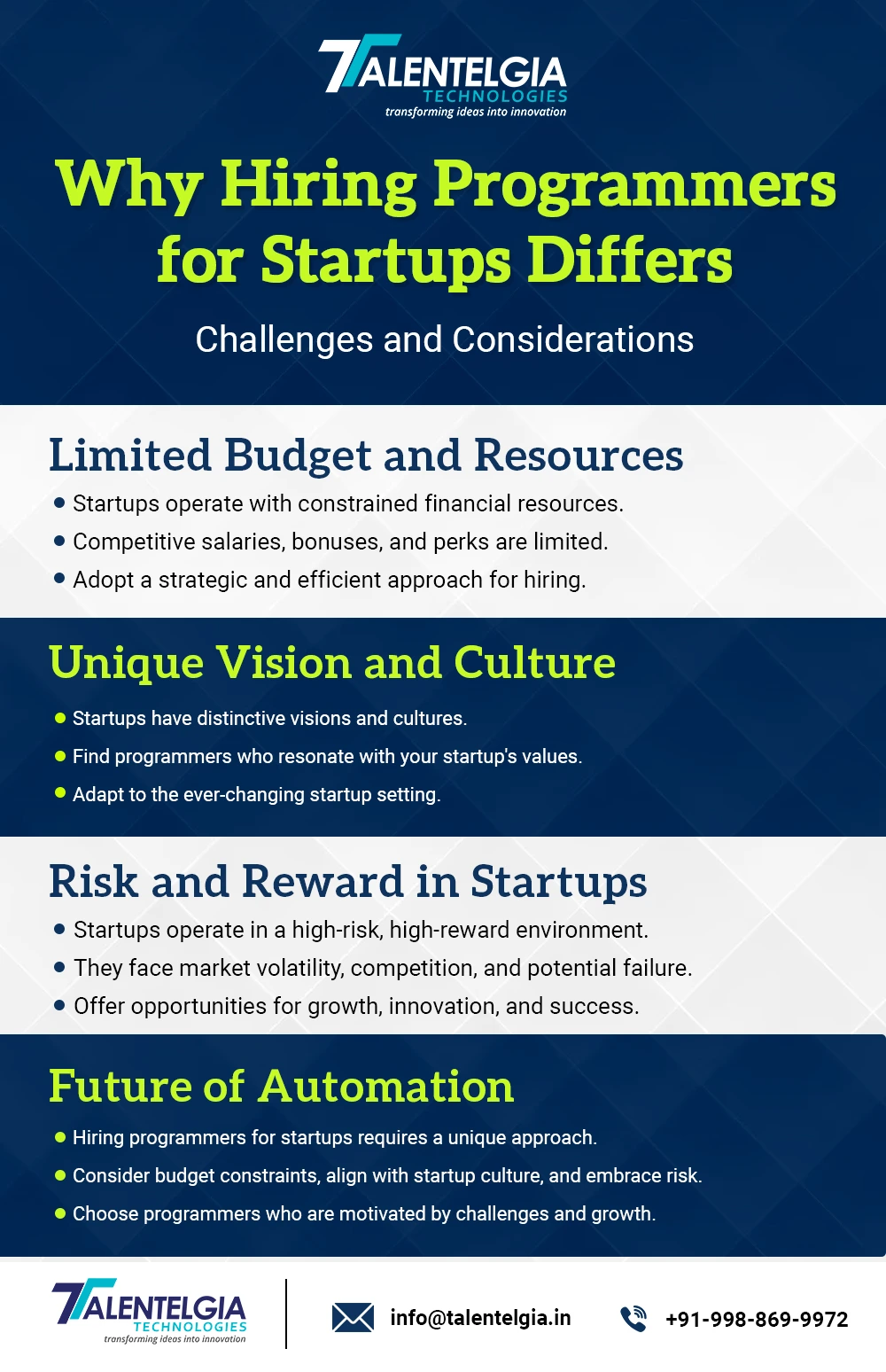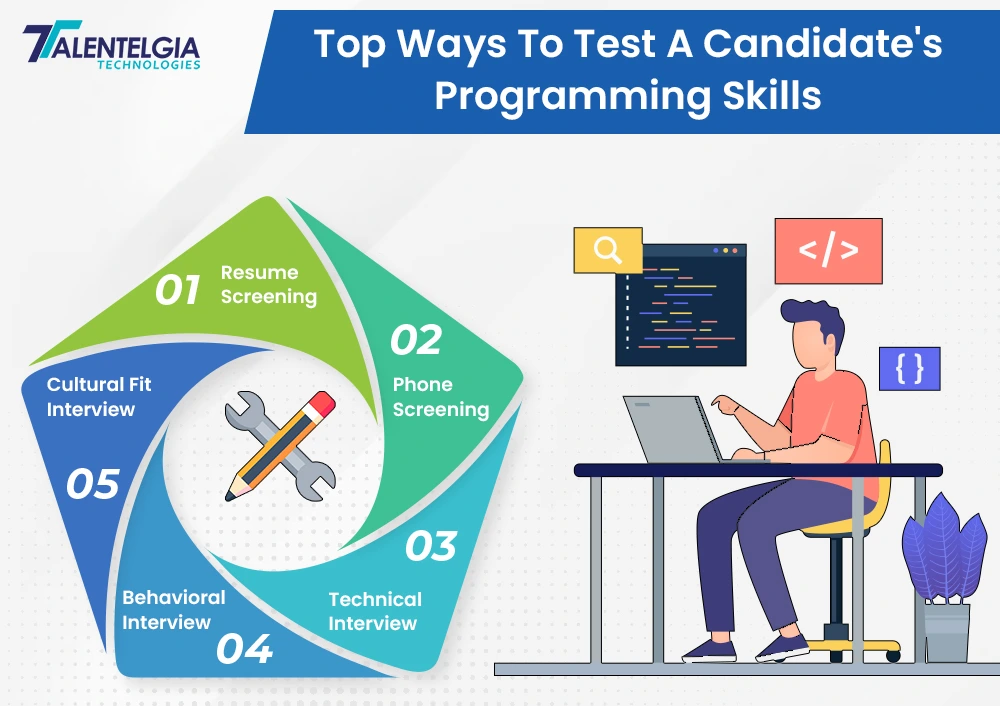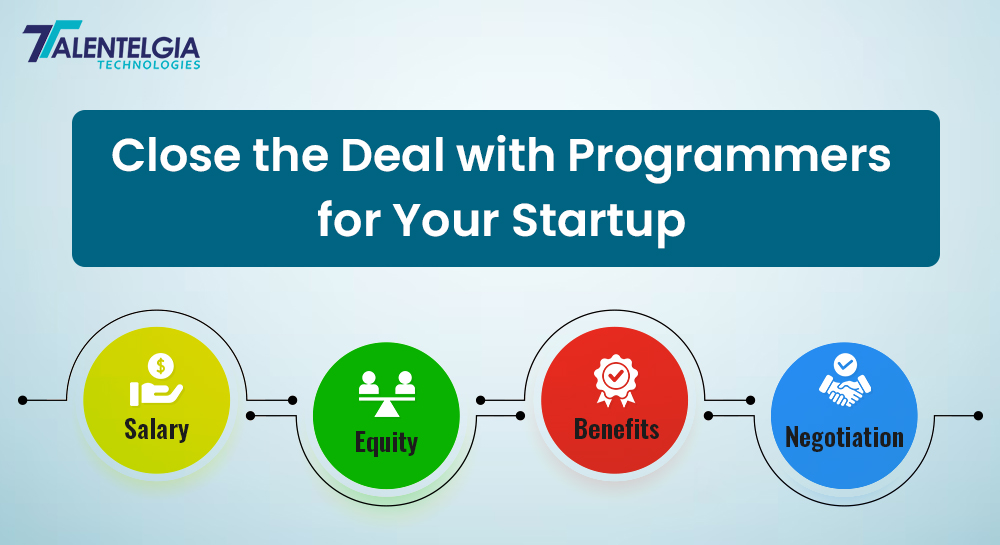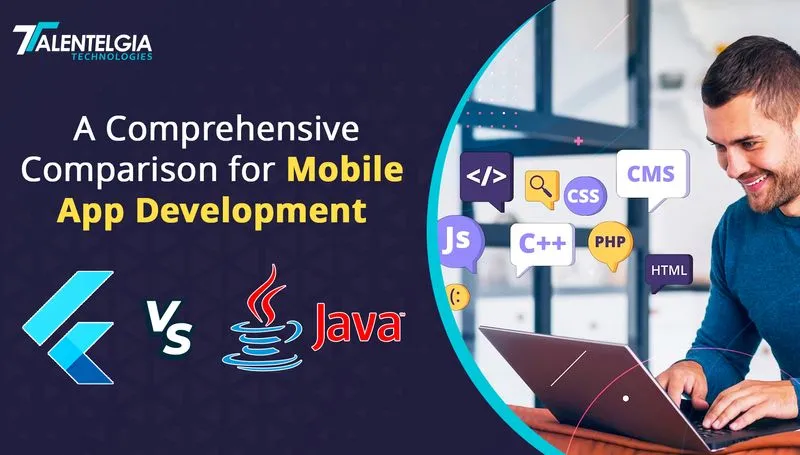Hiring programmers for startup can prove to be a challenging task. It requires identifying individuals with the right skill set, synced with your vision and company culture, all while taking into account budget limitations, project timelines, and quality standards. How can you go about discovering and enticing the most suitable programmers for your startup? How can you effectively assess their abilities and potential? And once they’re onboard, how can you ensure they stay with your team?
This blog post is focused on providing answers to these vital questions and presenting you with a detailed guide on how to recruit programmers for your startup. It’s worth emphasizing that the demand for coding skills has been increasing 50% more rapidly than the overall job market.
By the time you conclude reading this post, you’ll be fully prepared with the information necessary to effectively navigate the programmer hiring process for startup.
Why Hiring Programmers for Startup is Different from Hiring for Other Companies?

Hiring programmers for startup presents distinct challenges compared to hiring for established corporations due to several key factors:
- Limited Budget and Resources: Startups typically operate with constrained financial resources, offering less competitive salaries, bonuses, stock options, and perks compared to established companies. Additionally, startups often lack the time and workforce needed for extensive hiring processes. Therefore, it’s crucial to adopt a strategic and efficient approach to attract programmers willing to work within these limitations.
- Unique Vision and Culture: Startups have their own distinctive vision and culture that distinguishes them from larger organizations. They might aim to address specific problems, target niche markets, or pursue groundbreaking ideas. Furthermore, startups often have unique methods of working, communicating, and collaborating. As a result, it’s crucial to find programmers who resonate with your startup’s vision and values and can easily adjust to its ever-changing setting.
- Risk and Reward in Startup Ventures: Startups naturally function within an environment characterized by significant risks and potential rewards. They face unknowns, market volatility, intense competition, and the potential for failure. Simultaneously, startups offer opportunities for substantial growth, innovation, learning, and success. Thus, it’s vital to identify and attract programmers comfortable with risk, motivated by challenges, and eager for personal and professional growth.
These differences make hiring programmers for startup, complex and require careful planning.
What Skills and Qualities to Look for in Programmers for Your Startup?
When seeking programmers for your startup, it’s crucial to evaluate a combination of technical skills and relevant soft skills essential for your project’s success.
Here’s a list of skills and attributes to consider when recruiting programmers for your startup:
- Technical Skills: These encompass the specific knowledge and proficiencies required to execute programming tasks effectively. Additionally, testing their technical skills with coding challenges or assignments related to your project can be informative.
- Soft Skills: Soft skills are qualities needed for working well with others and achieving goals. For programmers, key soft skills may include strong communication, teamwork, problem-solving, creativity, adaptability, and more. Evaluating soft skills can involve observing a programmer’s personality, behavior, attitude, or seeking feedback from previous employers or clients. You can also assess their soft skills by presenting situational or behavioral questions or scenarios relevant to your project.
- Startup Mindset: A startup mindset entails the specific attitude and approach necessary to thrive in a startup environment. This might encompass characteristics like passion, curiosity, resilience, agility, and a sense of ownership. To gauge a startup mindset, examine a programmer’s motivation, interests, vision, or personal values. You can also assess their agreement with a startup mindset through questions or scenarios connected to the unique challenges and opportunities your startup presents.
It’s important to note that these skills and qualities are not mutually exclusive and may vary based on your project’s requirements and specific preferences. However, they can serve as a valuable guideline when considering programmers for your startup.
How to Source and Recruit Programmers for Your Startup?
Once you’ve identified the desired skills and qualities you’re seeking in programmers for your startup, the next step is to locate and draw them into your recruitment process. There are numerous methods for sourcing and recruiting programmers for your startup, including:
- Referrals: Referrals stand out as one of the most effective and dependable means to find and hire programmers for your startup. You can tap into your existing team members, professional network, or community to seek referrals for programmers they may know or have previously collaborated with. Relying on referrals can save you time and resources while enhancing the quality and agreement of your candidates. You might also consider providing incentives or rewards to encourage more referrals.
- Online Platforms: They offer an additional, widely-adopted, and user-friendly avenue for discovering and enlisting programmers for your startup. Furthermore, you have the option to leverage online tools and services, like Indeed.com or Upwork, to remotely outsource or enlist programmers for your startup.
- Events: Events serve as a dynamic and interactive strategy for unearthing and engaging programmers for your startup. By partaking in or organizing events such as hackathons, meetups, workshops, conferences, and other gatherings, you establish connections with programmers who hold an interest or have involvement in your industry or domain. This setting also offers you the opportunity to pinpoint and enlist adept programmers who share a fervor for your project.
These represent some of the common methods for sourcing and recruiting programmers for your startup. However, you can also explore additional techniques and strategies that align with your specific requirements and preferences.
How to Conduct Interviews and Tests to Assess Programmers for Your Startup?

Once you’ve successfully sourced and hiring programmers for startup, the next crucial step involves conducting interviews and assessments to gauge their suitability for your project.
There exist various types of interviews and tests at your disposal for evaluating programmers for your startup, including:
- Resume Screening: The initial stage in the hiring process, resume screening involves a review of the programmer’s resume or CV to assess fundamental details such as education, experience, skills, achievements, and more. This process assists in filtering out candidates who do not meet your minimum requirements or expectations.
- Phone Screening: Phone screening follows, wherein you contact the programmer to validate their information, pose basic questions, or arrange further interviews. This step helps confirm the candidate’s availability, interest, communication skills, and personality.
- Technical Interview: The cornerstone of the hiring process, the technical interview involves posing technical questions or assigning technical tasks relevant to your project. This interview aids in evaluating the candidate’s technical skills, knowledge, logical reasoning, and problem-solving abilities.
- Behavioral Interview: Another integral stage in the hiring process, the behavioral interview involves presenting the programmer with behavioral questions or scenarios tied to your project. This interview is valuable for assessing the candidate’s soft skills, attitude, behavior, and potential.
- Cultural Fit Interview: The final step in the hiring process, the cultural fit interview entails posing questions or presenting scenarios linked to your vision and company culture. This interview is instrumental in evaluating the candidate’s alignment with your startup’s mindset, motivation, interests, values, and overall fit.
These represent some of the common interview types and assessments available for evaluating programmers for your startup. However, you can also explore alternative methods or formats that align with your specific requirements and preferences.
How to Make an Offer and Close the Deal with Programmers for Your Startup?

Once you’ve concluded the interviews and evaluations to assess programmers for your startup, the subsequent phase involves extending an offer and formalizing the agreement with them.
This process necessitates consideration of several vital factors, which include:
- Salary: Undoubtedly, one of the most pivotal determinants impacting a programmer’s decision to accept or decline your offer is the compensation package. Your offer should encompass compensation that is fair, competitive, and appealing to the programmer, taking into account their skill set, experience, geographical location, market standards, and more. Simultaneously, you must carefully consider your budget and available resources when defining the compensation package.
- Equity: Equity represents another substantial aspect that can sway a programmer’s acceptance of your offer. It signifies the ownership or profit share extended to the programmer in return for their contributions. Your equity offering should be reasonable, generous, and appealing, aligning with the programmer’s role, potential impact, and other pertinent factors. Your startup’s equity and valuation should also be part of this consideration.
- Benefits: The benefits package is yet another significant element that holds sway over a programmer’s decision regarding your offer. Benefits encompass additional advantages beyond the salary and equity, such as health insurance, flexible work hours, remote work options, paid leave, opportunities for eLearning development, and more. It’s crucial to provide benefits that are relevant, valuable, and attractive to the programmer, tailored to their specific needs, preferences, and expectations. Moreover, your budget and available resources should factor into the provision of benefits.
- Negotiation: Negotiation is a fundamental aspect of the process that can significantly impact a programmer’s acceptance of your offer. This involves discussing and arriving at a mutual agreement on the terms and conditions of the offer with the programmer. Effective negotiation demands preparation, confidence, and respect when engaging with the programmer. Flexibility, realism, and fairness are equally important when it comes to either making or accepting counteroffers.
These represent some of the key considerations when crafting an offer and finalizing the deal with programmers for your startup. Nonetheless, you have the flexibility to explore alternative methods or strategies to suit your specific requirements and preferences.
How to Onboard and Retain Programmers for Your Startup?
After you’ve successfully extended an offer and solidified agreements with programmers for your startup, the subsequent crucial phases involve onboarding and retaining them for your project.
This process encompasses a series of steps, including:
- Integration: Integration marks the concluding phase in the onboarding process, striving to assimilate the programmer into your team and project. It involves active participation of the programmer in team activities, meetings, discussions, project-related decisions, updates, reviews, and other collaborative endeavors.
- Retention: Retention is an ongoing process aimed at maintaining the programmer’s engagement and satisfaction with your project and team. This entails the provision of continuous feedback, guidance, learning opportunities, challenges, and growth pathways necessary for enhancing the programmer’s skills and performance.
These represent some of the standard procedures involved in onboarding and retaining programmers for your startup. However, you have the flexibility to explore alternative methods or strategies tailored to your specific requirements and preferences.
Conclusion
Hiring programmers for startup is a crucial and complex process that requires careful planning and execution. You need to find programmers who have both technical skills and soft skills that are relevant and essential for your project. You also need to find programmers who have a startup mindset that matches your vision and culture.
You can use various ways to source and recruit programmers for your startup, such as referrals, online platforms, or events.
FAQs
Q: What experience should a programmer possess to meet my project requirements?
A: The experience needed for a programmer varies according to the project’s size, complexity, and standards for quality. For a simple or initial project, it could be appropriate to engage a junior or mid-level programmer possessing fundamental to intermediate skills and familiarity with the relevant programming language.
Conversely, for a complex or scalable project, it’s advisable to recruit the services of a senior or experienced programmer who has advanced to advanced skills and a deep understanding of the specific programming language. Factors to assess a programmer’s experience encompass their years of experience, portfolio, resume, certifications, online profiles (such as GitHub or Stack Overflow), and more..
Q: Where can I find qualified programmers for my startup?
A: There are multiple avenues for discovering qualified programmers for your startup, including:
- Referrals: You can leverage your existing team members, network, or community to refer programmers they know or have collaborated with. Referrals can expedite your hiring process, enhance the quality and suitability of candidates, and you can incentivize referrals with rewards or incentives.
- Online Platforms: Utilize various online platforms, such as job boards (like Indeed or Glassdoor), social media (e.g., LinkedIn or Twitter), blogs, podcasts, and newsletters to post job openings, showcase your project, and share your vision and culture. Online platforms provide access to a diverse pool of candidates and contribute to building brand awareness and reputation. Platforms like Indeed.com or Upwork can help you outsource or hire remote programmers for your startup.
- Events: Attend or host events such as hackathons, meetups, workshops, and conferences to connect with programmers in your industry or domain. Events provide an opportunity to establish relationships and trust with potential candidates, demonstrate your skills and expertise, and even scout or recruit programmers who are passionate or exceptionally talented in your project.
Q: How do I screen and interview potential programmers for my startup?
A: To evaluate potential programmers for your startup, you can use various screening and interviewing methods, including:
- Resume Screening: The initial step in the hiring process involves reviewing the programmer’s resume or CV to assess their fundamental information, such as education, experience, skills, achievements, and more. Resume screening helps filter out candidates who don’t meet your minimum requirements or expectations.
- Phone Screening: The subsequent step comprises calling the programmer to validate their details, ask basic questions, or schedule further interviews. Phone screening confirms the candidate’s availability, interest, communication skills, and personality.
- Technical Interview: In the main phase of the hiring process, you pose technical questions or assign technical tasks related to your project. Technical interviews assess the candidate’s technical skills, knowledge, logic, and problem-solving capabilities.
- Behavioral Interview: Another critical phase in the hiring process involves posing behavioral questions or presenting behavioral scenarios that are pertinent to your project. Behavioral interviews evaluate the candidate’s soft skills, attitude, behavior, and potential.
- Cultural Fit Interview: The final stage of the hiring programmers for startup process entails asking questions or presenting scenarios related to your startup’s vision and culture. Cultural fit interviews assess the candidate’s startup mindset, motivation, interest, values, and fit.


 Healthcare App Development Services
Healthcare App Development Services
 Real Estate Web Development Services
Real Estate Web Development Services
 E-Commerce App Development Services
E-Commerce App Development Services E-Commerce Web Development Services
E-Commerce Web Development Services Blockchain E-commerce Development Company
Blockchain E-commerce Development Company
 Fintech App Development Services
Fintech App Development Services Fintech Web Development
Fintech Web Development Blockchain Fintech Development Company
Blockchain Fintech Development Company
 E-Learning App Development Services
E-Learning App Development Services
 Restaurant App Development Company
Restaurant App Development Company
 Mobile Game Development Company
Mobile Game Development Company
 Travel App Development Company
Travel App Development Company
 Automotive Web Design
Automotive Web Design
 AI Traffic Management System
AI Traffic Management System
 AI Inventory Management Software
AI Inventory Management Software
 AI Software Development
AI Software Development  AI Development Company
AI Development Company  AI App Development Services
AI App Development Services  ChatGPT integration services
ChatGPT integration services  AI Integration Services
AI Integration Services  Generative AI Development Services
Generative AI Development Services  Natural Language Processing Company
Natural Language Processing Company Machine Learning Development
Machine Learning Development  Machine learning consulting services
Machine learning consulting services  Blockchain Development
Blockchain Development  Blockchain Software Development
Blockchain Software Development  Smart Contract Development Company
Smart Contract Development Company  NFT Marketplace Development Services
NFT Marketplace Development Services  Asset Tokenization Company
Asset Tokenization Company DeFi Wallet Development Company
DeFi Wallet Development Company Mobile App Development
Mobile App Development  IOS App Development
IOS App Development  Android App Development
Android App Development  Cross-Platform App Development
Cross-Platform App Development  Augmented Reality (AR) App Development
Augmented Reality (AR) App Development  Virtual Reality (VR) App Development
Virtual Reality (VR) App Development  Web App Development
Web App Development  SaaS App Development
SaaS App Development Flutter
Flutter  React Native
React Native  Swift (IOS)
Swift (IOS)  Kotlin (Android)
Kotlin (Android)  Mean Stack Development
Mean Stack Development  AngularJS Development
AngularJS Development  MongoDB Development
MongoDB Development  Nodejs Development
Nodejs Development  Database Development
Database Development Ruby on Rails Development
Ruby on Rails Development Expressjs Development
Expressjs Development  Full Stack Development
Full Stack Development  Web Development Services
Web Development Services  Laravel Development
Laravel Development  LAMP Development
LAMP Development  Custom PHP Development
Custom PHP Development  .Net Development
.Net Development  User Experience Design Services
User Experience Design Services  User Interface Design Services
User Interface Design Services  Automated Testing
Automated Testing  Manual Testing
Manual Testing  Digital Marketing Services
Digital Marketing Services 
 Ride-Sharing And Taxi Services
Ride-Sharing And Taxi Services Food Delivery Services
Food Delivery Services Grocery Delivery Services
Grocery Delivery Services Transportation And Logistics
Transportation And Logistics Car Wash App
Car Wash App Home Services App
Home Services App ERP Development Services
ERP Development Services CMS Development Services
CMS Development Services LMS Development
LMS Development CRM Development
CRM Development DevOps Development Services
DevOps Development Services AI Business Solutions
AI Business Solutions AI Cloud Solutions
AI Cloud Solutions AI Chatbot Development
AI Chatbot Development API Development
API Development Blockchain Product Development
Blockchain Product Development Cryptocurrency Wallet Development
Cryptocurrency Wallet Development About Talentelgia
About Talentelgia  Our Team
Our Team  Our Culture
Our Culture 
 Healthcare App Development Services
Healthcare App Development Services Real Estate Web Development Services
Real Estate Web Development Services E-Commerce App Development Services
E-Commerce App Development Services E-Commerce Web Development Services
E-Commerce Web Development Services Blockchain E-commerce
Development Company
Blockchain E-commerce
Development Company Fintech App Development Services
Fintech App Development Services Finance Web Development
Finance Web Development Blockchain Fintech
Development Company
Blockchain Fintech
Development Company E-Learning App Development Services
E-Learning App Development Services Restaurant App Development Company
Restaurant App Development Company Mobile Game Development Company
Mobile Game Development Company Travel App Development Company
Travel App Development Company Automotive Web Design
Automotive Web Design AI Traffic Management System
AI Traffic Management System AI Inventory Management Software
AI Inventory Management Software AI Software Development
AI Software Development AI Development Company
AI Development Company ChatGPT integration services
ChatGPT integration services AI Integration Services
AI Integration Services Machine Learning Development
Machine Learning Development Machine learning consulting services
Machine learning consulting services Blockchain Development
Blockchain Development Blockchain Software Development
Blockchain Software Development Smart contract development company
Smart contract development company NFT marketplace development services
NFT marketplace development services IOS App Development
IOS App Development Android App Development
Android App Development Cross-Platform App Development
Cross-Platform App Development Augmented Reality (AR) App
Development
Augmented Reality (AR) App
Development Virtual Reality (VR) App Development
Virtual Reality (VR) App Development Web App Development
Web App Development Flutter
Flutter React
Native
React
Native Swift
(IOS)
Swift
(IOS) Kotlin (Android)
Kotlin (Android) MEAN Stack Development
MEAN Stack Development AngularJS Development
AngularJS Development MongoDB Development
MongoDB Development Nodejs Development
Nodejs Development Database development services
Database development services Ruby on Rails Development services
Ruby on Rails Development services Expressjs Development
Expressjs Development Full Stack Development
Full Stack Development Web Development Services
Web Development Services Laravel Development
Laravel Development LAMP
Development
LAMP
Development Custom PHP Development
Custom PHP Development User Experience Design Services
User Experience Design Services User Interface Design Services
User Interface Design Services Automated Testing
Automated Testing Manual
Testing
Manual
Testing About Talentelgia
About Talentelgia Our Team
Our Team Our Culture
Our Culture

















 Write us on:
Write us on:  Business queries:
Business queries:  HR:
HR: 




